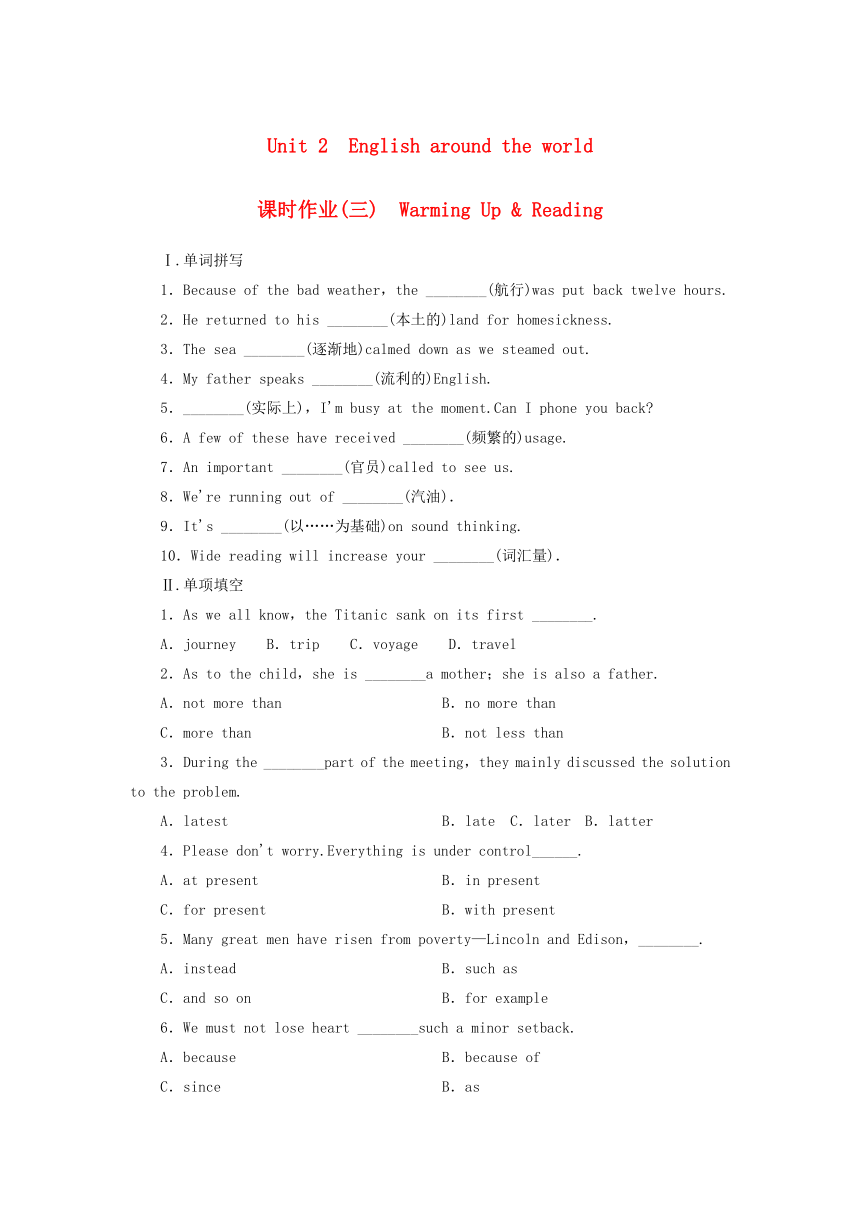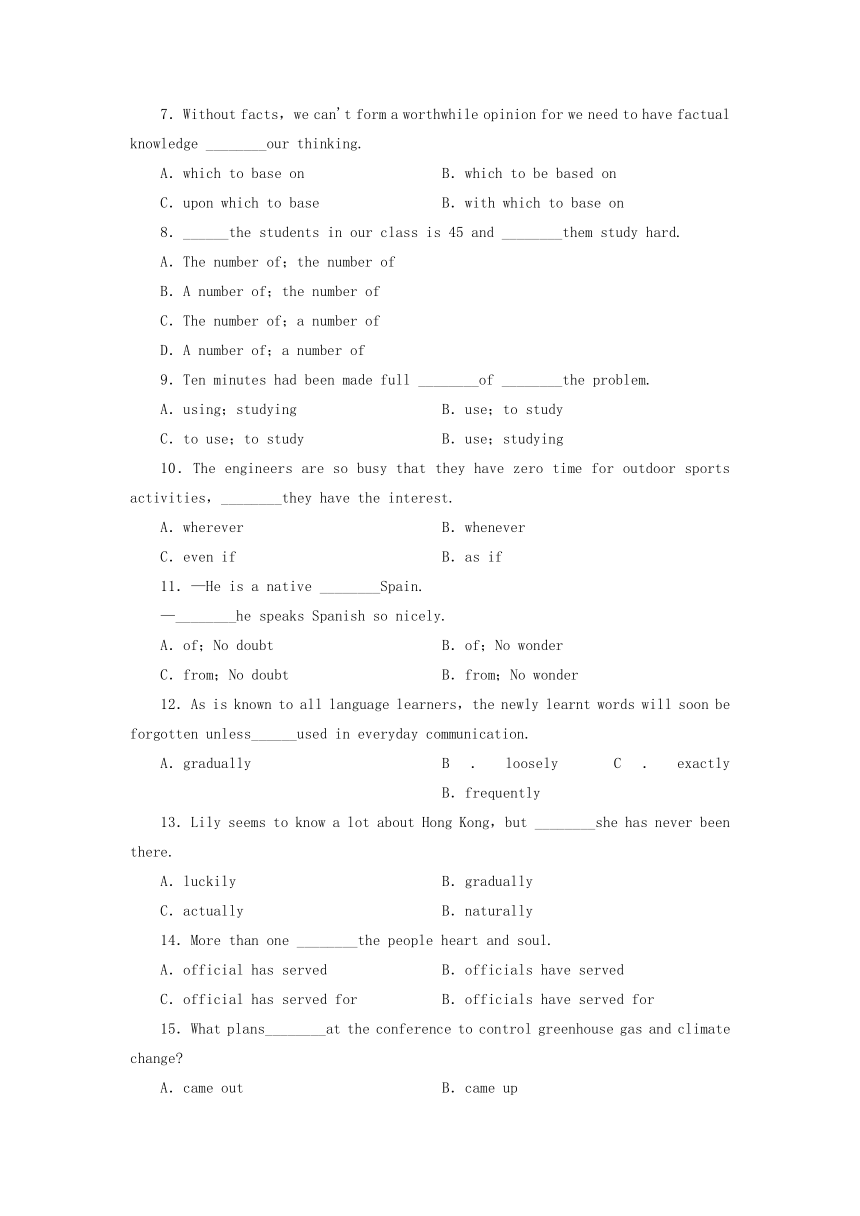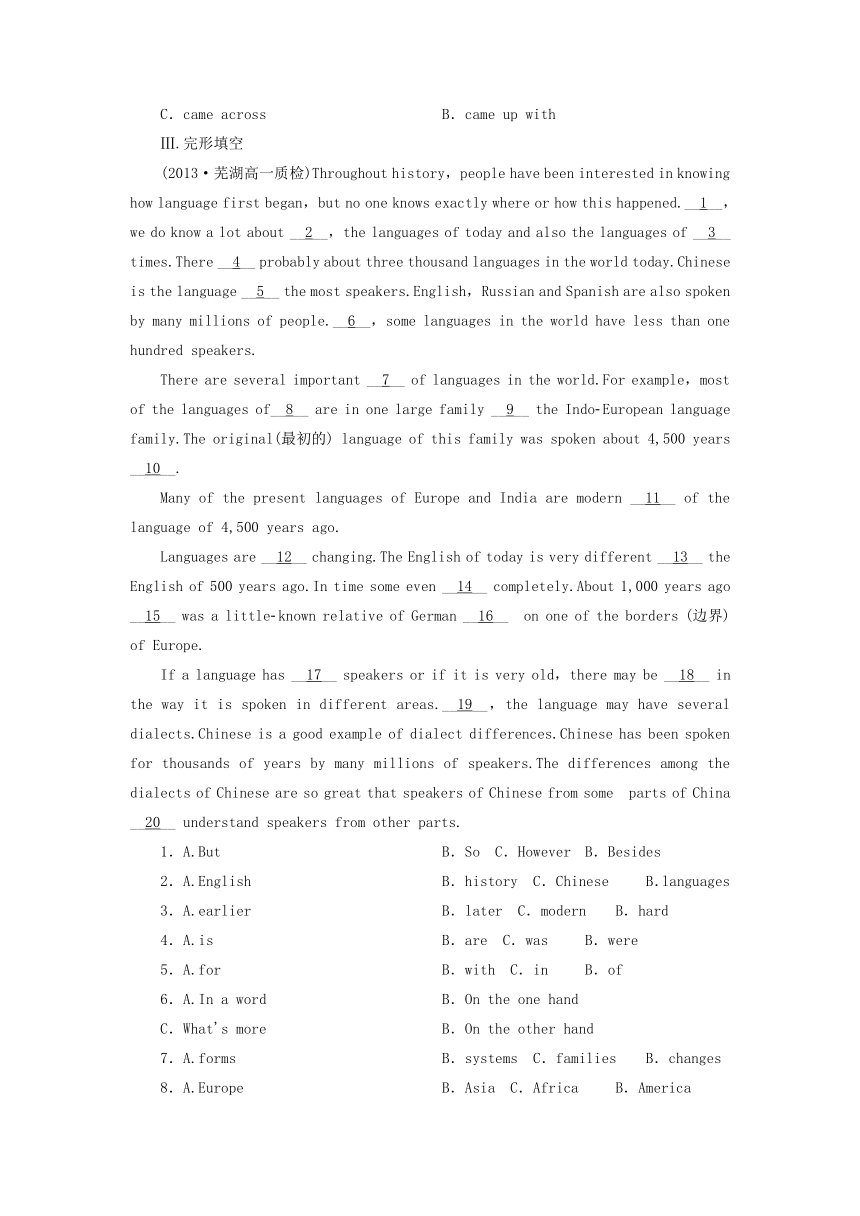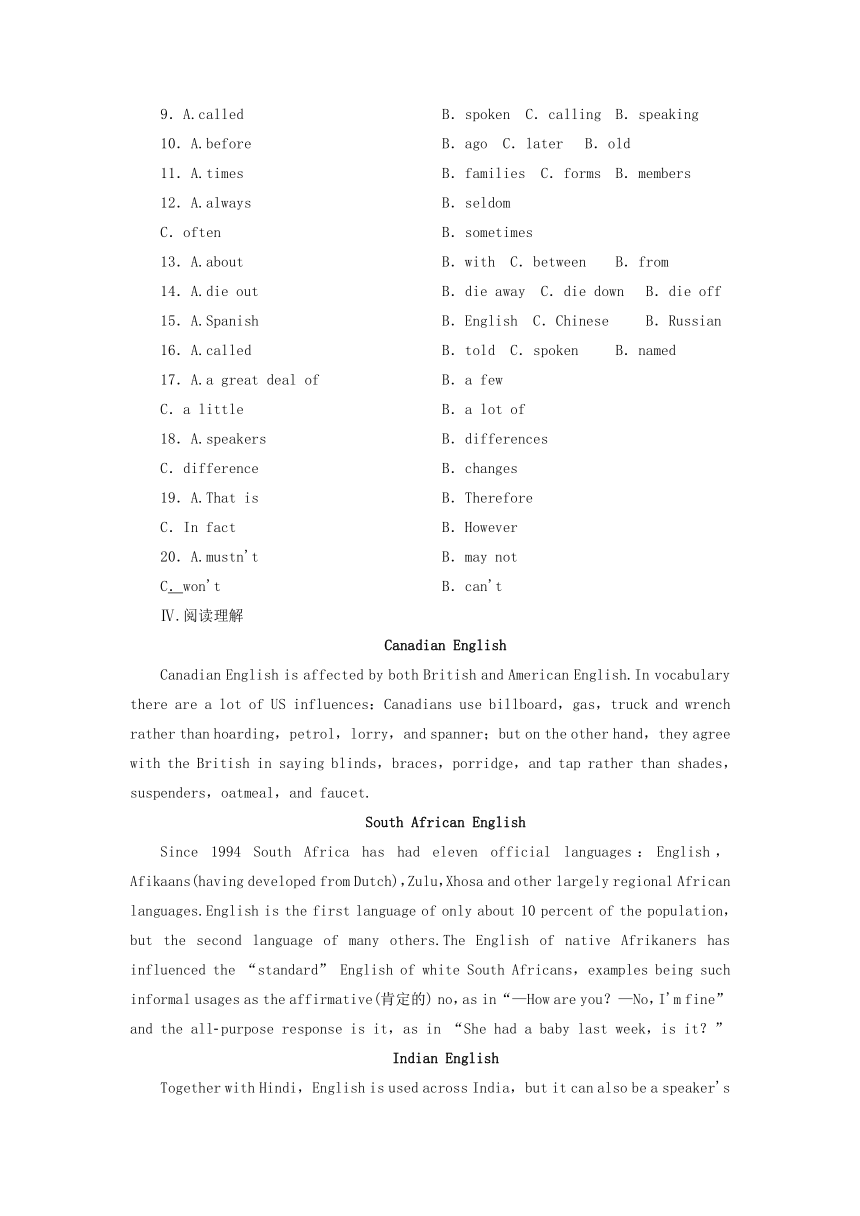2014-2015学年高中英语 Unit 2 English around the world Warming Up & Reading课时作业 人教新课标必修1
文档属性
| 名称 | 2014-2015学年高中英语 Unit 2 English around the world Warming Up & Reading课时作业 人教新课标必修1 |  | |
| 格式 | zip | ||
| 文件大小 | 24.0KB | ||
| 资源类型 | 教案 | ||
| 版本资源 | 人教版(新课程标准) | ||
| 科目 | 英语 | ||
| 更新时间 | 2014-11-22 09:35:37 | ||
图片预览




文档简介
Unit 2 English around the world
课时作业(三) Warming Up & Reading
Ⅰ.单词拼写
1.Because of the bad weather,the ________(航行)was put back twelve hours.
2.He returned to his ________(本土的)land for homesickness.
3.The sea ________(逐渐地)calmed down as we steamed out.
4.My father speaks ________(流利的)English.
5.________(实际上),I'm busy at the moment.Can I phone you back?
6.A few of these have received ________(频繁的)usage.
7.An important ________(官员)called to see us.
8.We're running out of ________(汽油).
9.It's ________(以……为基础)on sound thinking.
10.Wide reading will increase your ________(词汇量).
Ⅱ.单项填空
1.As we all know,the Titanic sank on its first ________.
A.journey B.trip C.voyage D.travel
2.As to the child,she is ________a mother;she is also a father.
A.not more than B.no more than
C.more than B.not less than
3.During the ________part of the meeting,they mainly discussed the solution to the problem.
A.latest B.late C.later B.latter
4.Please don't worry.Everything is under control______.
A.at present B.in present
C.for present B.with present
5.Many great men have risen from poverty—Lincoln and Edison,________.
A.instead B.such as
C.and so on B.for example
6.We must not lose heart ________such a minor setback.
A.because B.because of
C.since B.as
7.Without facts,we can't form a worthwhile opinion for we need to have factual knowledge ________our thinking.
A.which to base on B.which to be based on
C.upon which to base B.with which to base on
8.______the students in our class is 45 and ________them study hard.
A.The number of;the number of
B.A number of;the number of
C.The number of;a number of
D.A number of;a number of
9.Ten minutes had been made full ________of ________the problem.
A.using;studying B.use;to study
C.to use;to study B.use;studying
10.The engineers are so busy that they have zero time for outdoor sports activities,________they have the interest.
A.wherever B.whenever
C.even if B.as if
11.—He is a native ________Spain.
—________he speaks Spanish so nicely.
A.of;No doubt B.of;No wonder
C.from;No doubt B.from;No wonder
12.As is known to all language learners,the newly learnt words will soon be forgotten unless______used in everyday communication.
A.gradually B.loosely C.exactly B.frequently
13.Lily seems to know a lot about Hong Kong,but ________she has never been there.
A.luckily B.gradually
C.actually B.naturally
14.More than one ________the people heart and soul.
A.official has served B.officials have served
C.official has served for B.officials have served for
15.What plans________at the conference to control greenhouse gas and climate change?
A.came out B.came up
C.came across B.came up with
Ⅲ.完形填空
(2013·芜湖高一质检)Throughout history,people have been interested in knowing how language first began,but no one knows exactly where or how this happened.__1__,we do know a lot about __2__,the languages of today and also the languages of __3__ times.There __4__ probably about three thousand languages in the world today.Chinese is the language __5__ the most speakers.English,Russian and Spanish are also spoken by many millions of people.__6__,some languages in the world have less than one hundred speakers.
There are several important __7__ of languages in the world.For example,most of the languages of__8__ are in one large family __9__ the Indo-European language family.The original(最初的) language of this family was spoken about 4,500 years __10__.
Many of the present languages of Europe and India are modern __11__ of the language of 4,500 years ago.
Languages are __12__ changing.The English of today is very different __13__ the English of 500 years ago.In time some even __14__ completely.About 1,000 years ago __15__ was a little-known relative of German __16__ on one of the borders (边界) of Europe.
If a language has __17__ speakers or if it is very old,there may be __18__ in the way it is spoken in different areas.__19__,the language may have several dialects.Chinese is a good example of dialect differences.Chinese has been spoken for thousands of years by many millions of speakers.The differences among the dialects of Chinese are so great that speakers of Chinese from some parts of China __20__ understand speakers from other parts.
1.A.But B.So C.However B.Besides
2.A.English B.history C.Chinese B.languages
3.A.earlier B.later C.modern B.hard
4.A.is B.are C.was B.were
5.A.for B.with C.in B.of
6.A.In a word B.On the one hand
C.What's more B.On the other hand
7.A.forms B.systems C.families B.changes
8.A.Europe B.Asia C.Africa B.America
9.A.called B.spoken C.calling B.speaking
10.A.before B.ago C.later B.old
11.A.times B.families C.forms B.members
12.A.always B.seldom
C.often B.sometimes
13.A.about B.with C.between B.from
14.A.die out B.die away C.die down B.die off
15.A.Spanish B.English C.Chinese B.Russian
16.A.called B.told C.spoken B.named
17.A.a great deal of B.a few
C.a little B.a lot of
18.A.speakers B.differences
C.difference B.changes
19.A.That is B.Therefore
C.In fact B.However
20.A.mustn't B.may not
C.won't B.can't
Ⅳ.阅读理解
Canadian English
Canadian English is affected by both British and American English.In vocabulary there are a lot of US influences:Canadians use billboard,gas,truck and wrench rather than hoarding,petrol,lorry,and spanner;but on the other hand,they agree with the British in saying blinds,braces,porridge,and tap rather than shades,suspenders,oatmeal,and faucet.
South African English
Since 1994 South Africa has had eleven official languages:English,Afikaans(having developed from Dutch),Zulu,Xhosa and other largely regional African languages.English is the first language of only about 10 percent of the population,but the second language of many others.The English of native Afrikaners has influenced the “standard” English of white South Africans,examples being such informal usages as the affirmative(肯定的) no,as in“—How are you?—No,I'm fine” and the all-purpose response is it,as in “She had a baby last week,is it?”
Indian English
Together with Hindi,English is used across India,but it can also be a speaker's first,second,or third language.The grammar of Indian English has many distinguishing features,of which perhaps the best known are the use of the present continuous tense,as in “He is having very much of property”,and the use of “isn't it” as an ordinary question tag,“We are meeting tomorrow,isn't it?”The first example shows another characteristic of the language,which is using in or of in idiomatic phrases.Verbs are also used differently,with speakers often dropping a preposition or object altogether,“I insisted immediate payment”,while double possessives(所有格)—“our these prices” (instead of the British English “these prices of ours”)—are common.
1.What does the underlined word “distinguishing” mean in Paragraph 3?
A.different B.same C.short B.missing
2.According to the passage,which group of words is all in American form?
A.Billboard,gas,blinds,braces.
B.Hoarding,petrol,Porridge,tap.
C.Truck,wrench,shades,suspenders.
D.Lorry,spanner,oatmeal,faucet.
3.What can be learned from Paragraph 2?
A.Dutch is one of the official languages in South Africa.
B.Zulu is one of the official languages in South Africa.
C.Less than 10% of the South African people speak English as their second language.
D.More than 10% of the South African people speak English as their mother tongue.
4.How many distinguishing features of Indian English grammar are mentioned in the passage?
A.2 B.3 C.4 B.5
5.According to the passage,if you are an Indian,you are most likely to________.
A.use blinds instead of “shades”
B.say “The students had an exam last week,is it?”
C.use those suspenders of theirs instead of their those suspenders
D.say “The students are going to have an exam next week,isn't it?”
Ⅴ.翻译句子
1.我对你的讲话十分满意。(more than)
________________________________________________________________________
2.由于大雨,群众大会已宣布取消。(because of)
________________________________________________________________________
3.即使失败十次,他也不愿放弃这个实验。(even if)
________________________________________________________________________
4.我们应该利用机会。(make use of)
________________________________________________________________________
5.我预料很快就要出事的。(come up)
________________________________________________________________________
课时作业(三)
Ⅰ.1.voyage 2.native 3.gradually 4.fluent
5.Actually 6.frequent 7.official 8.petrol
9.based 10.vocabulary
Ⅱ.1.C 此处指海上旅行,用voyage。
2.C 句意:对于这个孩子来说,她不仅仅是一位母亲,还是一位父亲。more than不仅仅,符合题意。not more than不多于;no more than仅仅;not less than不少于。
3.D 句意:在会议的后半部分,他们主要讨论了问题的解决方法。latest最近的;late晚的;later较迟的;latter后面的。结合句意D项最佳。
4.A 句意:请不要担心,目前一切都在掌握之中。at present目前,现在,与句意相符。
5.D instead是副词,意为“代替,而是”;such as用来列举事物,不能用逗号隔开;and so on意思是“等等”,用在所列举的一系列事物之后;for example“例如,比如”,可放在句首、句中或句末,须用逗号隔开,用于对所说事情作解释时举例用。
6.B because,since和as都表示“因为”,都是连词,后应接句子,只有because of后接名词,代词或v.-ing形式。
7.C base A on B把A建立在B的基础上;which引导定语从句修饰factual knowledge,并在从句中作upon的宾语。此题是定语从句的省略形式。
8.C the number of后面的谓语用单数;a number of后面的谓语用复数。
9.B 此句中的短语make full use of使用了被动形式,后接不定式作目的状语。句意:充分利用十分钟的时间来研究这个问题。
10.C 句意:工程师们非常忙,尽管对户外运动感兴趣,他们也没时间。wherever无论何地;whenever无论何时;even if即使;as if好像。结合句意应选C。
11.B a native of...……的人;no wonder难怪,符合语境。故选B。
12.D 句意:所有语言学习者都知道,新学的单词不久就会忘记,除非在日常交流中频繁使用。gradually逐渐地;loosely松散地;exactly精确地;frequently频繁地。
13.C but后的分句表示“她实际上从来没去过那里”,故用actually(实际上,事实上)。
14.A more than one后面应该接可数名词单数,“more than one+可数名词单数”作主语时谓语用单数;serve在此表示“为……服务”,为及物动词,直接接宾语。因此选A。
15.B 句意为:会上提出了什么计划来控制温室气体和气候变化?由句意可排除A、C两项,come up with在表示“提出”讲时,主语应为表示人的名词或代词,故选B项。
Ⅲ.1.C 语言的起源一直是人们感兴趣的事情,但是没人确切地知道语言的起源究竟是怎样的。然而,我们还是对语言有许多了解。but后不能出现逗号。
2.D 由上下文可知此处一直是在讲对语言的认识,而不单纯是对汉语或英语的认识。
3.A 人们对现在的语言以及更早的语言有所了解。由上下文可知此处与today对应。
4.B 由后面的“about three thousand languages in the world today”可知此处应用be动词的一般现在时的复数形式。
5.B 由with引导的介词短语作定语,修饰language,表示“汉语是使用人数最多的一种语言”。
6.D 上文指出汉语是使用者最多的一种语言,接着又说英语、俄语和西班牙语也有数百万人使用,后文话锋一转讲到,还有不到一百人使用的语言,所以此处用on the other hand。
7.C 由后面的内容可知语言有几大语系,用families表示。下文的one large family也是提示。
8.A 由后面的Indo-European language family可知,欧洲的大多数语言都属于一个大的语系——印欧语系。
9.A 过去分词called作定语,表示“被称做”。
10.B 由前面的was spoken可知,此处应该用与一般过去时连用的ago。before用于过去完成时的句子中。
11.C 现在印度与欧洲的一些语言实际上就是4 500年以前的语言的现代形式(forms)。
12.A 由下文可知,语言一直都在发展变化。always与现在进行时态连用表示“总是”。
13.D be different from“与……不同”,为固定短语。
14.A 经过一段时间有些语言完全消失了。die out“灭绝;死光;消失”;die away“逐渐模糊;逐渐减弱”;die down“逐渐变弱;暗淡”;die off“相继死去”。
15.B 一千年前的英语还与当时人们讲的德语有亲戚关系。
16.C 表示“讲(某种语言)”用speak,此处用过去分词作定语表示被动。
17.D 讲某种语言的人多或某种语言很古老,那么不同地区人们说话的方式就有差别。A、C项只修饰不可数名词;a few表示“几个”,意义不符。
18.B 由上文可知此处指人们说话方式的不同,用复数形式。
19.A 此处是对上文的说明:也就是说(that is),一种语言可能有几种方言。
20.D 方言的差别如此之大,以至于来自不同地区的人都无法相互沟通。此处表示“不会,不能”,故用can't。
Ⅳ.1.A 词义猜测题。第三段所举的例子讲述了印度英语一些不同的用法,因此是指“不同的”。
2.C 细节理解题。由第一段第二句可知美国英语中常用到billboard,gas,truck,wrench及shades,suspenders,oatmeal,faucet。
3.B 细节理解题。由第二段第一句可知Zulu是南非官方语言的一种。其他选项与文意不符。
4.D 细节理解题。第三段提到了印度英语语法的五种与众不同的用法,分别是现在进行时用法,isn't it普遍用于附加疑问句,习惯搭配中插入in或of等,动词后省去介词(及宾语)和双重所有格用法。
5.D 细节理解题。根据各段所举的例子可知,A属于加拿大英语;B属于南非英语;C属于英国英语;D属于印度英语。
Ⅴ.1.I am more than content with what you said.
2.Because of the heavy rain,the public meeting has been declared off. 3.He won't give up the experiment even if he has failed ten times. 4.We should make use of the chance. 5.I expect something to come up soon.
课时作业(三) Warming Up & Reading
Ⅰ.单词拼写
1.Because of the bad weather,the ________(航行)was put back twelve hours.
2.He returned to his ________(本土的)land for homesickness.
3.The sea ________(逐渐地)calmed down as we steamed out.
4.My father speaks ________(流利的)English.
5.________(实际上),I'm busy at the moment.Can I phone you back?
6.A few of these have received ________(频繁的)usage.
7.An important ________(官员)called to see us.
8.We're running out of ________(汽油).
9.It's ________(以……为基础)on sound thinking.
10.Wide reading will increase your ________(词汇量).
Ⅱ.单项填空
1.As we all know,the Titanic sank on its first ________.
A.journey B.trip C.voyage D.travel
2.As to the child,she is ________a mother;she is also a father.
A.not more than B.no more than
C.more than B.not less than
3.During the ________part of the meeting,they mainly discussed the solution to the problem.
A.latest B.late C.later B.latter
4.Please don't worry.Everything is under control______.
A.at present B.in present
C.for present B.with present
5.Many great men have risen from poverty—Lincoln and Edison,________.
A.instead B.such as
C.and so on B.for example
6.We must not lose heart ________such a minor setback.
A.because B.because of
C.since B.as
7.Without facts,we can't form a worthwhile opinion for we need to have factual knowledge ________our thinking.
A.which to base on B.which to be based on
C.upon which to base B.with which to base on
8.______the students in our class is 45 and ________them study hard.
A.The number of;the number of
B.A number of;the number of
C.The number of;a number of
D.A number of;a number of
9.Ten minutes had been made full ________of ________the problem.
A.using;studying B.use;to study
C.to use;to study B.use;studying
10.The engineers are so busy that they have zero time for outdoor sports activities,________they have the interest.
A.wherever B.whenever
C.even if B.as if
11.—He is a native ________Spain.
—________he speaks Spanish so nicely.
A.of;No doubt B.of;No wonder
C.from;No doubt B.from;No wonder
12.As is known to all language learners,the newly learnt words will soon be forgotten unless______used in everyday communication.
A.gradually B.loosely C.exactly B.frequently
13.Lily seems to know a lot about Hong Kong,but ________she has never been there.
A.luckily B.gradually
C.actually B.naturally
14.More than one ________the people heart and soul.
A.official has served B.officials have served
C.official has served for B.officials have served for
15.What plans________at the conference to control greenhouse gas and climate change?
A.came out B.came up
C.came across B.came up with
Ⅲ.完形填空
(2013·芜湖高一质检)Throughout history,people have been interested in knowing how language first began,but no one knows exactly where or how this happened.__1__,we do know a lot about __2__,the languages of today and also the languages of __3__ times.There __4__ probably about three thousand languages in the world today.Chinese is the language __5__ the most speakers.English,Russian and Spanish are also spoken by many millions of people.__6__,some languages in the world have less than one hundred speakers.
There are several important __7__ of languages in the world.For example,most of the languages of__8__ are in one large family __9__ the Indo-European language family.The original(最初的) language of this family was spoken about 4,500 years __10__.
Many of the present languages of Europe and India are modern __11__ of the language of 4,500 years ago.
Languages are __12__ changing.The English of today is very different __13__ the English of 500 years ago.In time some even __14__ completely.About 1,000 years ago __15__ was a little-known relative of German __16__ on one of the borders (边界) of Europe.
If a language has __17__ speakers or if it is very old,there may be __18__ in the way it is spoken in different areas.__19__,the language may have several dialects.Chinese is a good example of dialect differences.Chinese has been spoken for thousands of years by many millions of speakers.The differences among the dialects of Chinese are so great that speakers of Chinese from some parts of China __20__ understand speakers from other parts.
1.A.But B.So C.However B.Besides
2.A.English B.history C.Chinese B.languages
3.A.earlier B.later C.modern B.hard
4.A.is B.are C.was B.were
5.A.for B.with C.in B.of
6.A.In a word B.On the one hand
C.What's more B.On the other hand
7.A.forms B.systems C.families B.changes
8.A.Europe B.Asia C.Africa B.America
9.A.called B.spoken C.calling B.speaking
10.A.before B.ago C.later B.old
11.A.times B.families C.forms B.members
12.A.always B.seldom
C.often B.sometimes
13.A.about B.with C.between B.from
14.A.die out B.die away C.die down B.die off
15.A.Spanish B.English C.Chinese B.Russian
16.A.called B.told C.spoken B.named
17.A.a great deal of B.a few
C.a little B.a lot of
18.A.speakers B.differences
C.difference B.changes
19.A.That is B.Therefore
C.In fact B.However
20.A.mustn't B.may not
C.won't B.can't
Ⅳ.阅读理解
Canadian English
Canadian English is affected by both British and American English.In vocabulary there are a lot of US influences:Canadians use billboard,gas,truck and wrench rather than hoarding,petrol,lorry,and spanner;but on the other hand,they agree with the British in saying blinds,braces,porridge,and tap rather than shades,suspenders,oatmeal,and faucet.
South African English
Since 1994 South Africa has had eleven official languages:English,Afikaans(having developed from Dutch),Zulu,Xhosa and other largely regional African languages.English is the first language of only about 10 percent of the population,but the second language of many others.The English of native Afrikaners has influenced the “standard” English of white South Africans,examples being such informal usages as the affirmative(肯定的) no,as in“—How are you?—No,I'm fine” and the all-purpose response is it,as in “She had a baby last week,is it?”
Indian English
Together with Hindi,English is used across India,but it can also be a speaker's first,second,or third language.The grammar of Indian English has many distinguishing features,of which perhaps the best known are the use of the present continuous tense,as in “He is having very much of property”,and the use of “isn't it” as an ordinary question tag,“We are meeting tomorrow,isn't it?”The first example shows another characteristic of the language,which is using in or of in idiomatic phrases.Verbs are also used differently,with speakers often dropping a preposition or object altogether,“I insisted immediate payment”,while double possessives(所有格)—“our these prices” (instead of the British English “these prices of ours”)—are common.
1.What does the underlined word “distinguishing” mean in Paragraph 3?
A.different B.same C.short B.missing
2.According to the passage,which group of words is all in American form?
A.Billboard,gas,blinds,braces.
B.Hoarding,petrol,Porridge,tap.
C.Truck,wrench,shades,suspenders.
D.Lorry,spanner,oatmeal,faucet.
3.What can be learned from Paragraph 2?
A.Dutch is one of the official languages in South Africa.
B.Zulu is one of the official languages in South Africa.
C.Less than 10% of the South African people speak English as their second language.
D.More than 10% of the South African people speak English as their mother tongue.
4.How many distinguishing features of Indian English grammar are mentioned in the passage?
A.2 B.3 C.4 B.5
5.According to the passage,if you are an Indian,you are most likely to________.
A.use blinds instead of “shades”
B.say “The students had an exam last week,is it?”
C.use those suspenders of theirs instead of their those suspenders
D.say “The students are going to have an exam next week,isn't it?”
Ⅴ.翻译句子
1.我对你的讲话十分满意。(more than)
________________________________________________________________________
2.由于大雨,群众大会已宣布取消。(because of)
________________________________________________________________________
3.即使失败十次,他也不愿放弃这个实验。(even if)
________________________________________________________________________
4.我们应该利用机会。(make use of)
________________________________________________________________________
5.我预料很快就要出事的。(come up)
________________________________________________________________________
课时作业(三)
Ⅰ.1.voyage 2.native 3.gradually 4.fluent
5.Actually 6.frequent 7.official 8.petrol
9.based 10.vocabulary
Ⅱ.1.C 此处指海上旅行,用voyage。
2.C 句意:对于这个孩子来说,她不仅仅是一位母亲,还是一位父亲。more than不仅仅,符合题意。not more than不多于;no more than仅仅;not less than不少于。
3.D 句意:在会议的后半部分,他们主要讨论了问题的解决方法。latest最近的;late晚的;later较迟的;latter后面的。结合句意D项最佳。
4.A 句意:请不要担心,目前一切都在掌握之中。at present目前,现在,与句意相符。
5.D instead是副词,意为“代替,而是”;such as用来列举事物,不能用逗号隔开;and so on意思是“等等”,用在所列举的一系列事物之后;for example“例如,比如”,可放在句首、句中或句末,须用逗号隔开,用于对所说事情作解释时举例用。
6.B because,since和as都表示“因为”,都是连词,后应接句子,只有because of后接名词,代词或v.-ing形式。
7.C base A on B把A建立在B的基础上;which引导定语从句修饰factual knowledge,并在从句中作upon的宾语。此题是定语从句的省略形式。
8.C the number of后面的谓语用单数;a number of后面的谓语用复数。
9.B 此句中的短语make full use of使用了被动形式,后接不定式作目的状语。句意:充分利用十分钟的时间来研究这个问题。
10.C 句意:工程师们非常忙,尽管对户外运动感兴趣,他们也没时间。wherever无论何地;whenever无论何时;even if即使;as if好像。结合句意应选C。
11.B a native of...……的人;no wonder难怪,符合语境。故选B。
12.D 句意:所有语言学习者都知道,新学的单词不久就会忘记,除非在日常交流中频繁使用。gradually逐渐地;loosely松散地;exactly精确地;frequently频繁地。
13.C but后的分句表示“她实际上从来没去过那里”,故用actually(实际上,事实上)。
14.A more than one后面应该接可数名词单数,“more than one+可数名词单数”作主语时谓语用单数;serve在此表示“为……服务”,为及物动词,直接接宾语。因此选A。
15.B 句意为:会上提出了什么计划来控制温室气体和气候变化?由句意可排除A、C两项,come up with在表示“提出”讲时,主语应为表示人的名词或代词,故选B项。
Ⅲ.1.C 语言的起源一直是人们感兴趣的事情,但是没人确切地知道语言的起源究竟是怎样的。然而,我们还是对语言有许多了解。but后不能出现逗号。
2.D 由上下文可知此处一直是在讲对语言的认识,而不单纯是对汉语或英语的认识。
3.A 人们对现在的语言以及更早的语言有所了解。由上下文可知此处与today对应。
4.B 由后面的“about three thousand languages in the world today”可知此处应用be动词的一般现在时的复数形式。
5.B 由with引导的介词短语作定语,修饰language,表示“汉语是使用人数最多的一种语言”。
6.D 上文指出汉语是使用者最多的一种语言,接着又说英语、俄语和西班牙语也有数百万人使用,后文话锋一转讲到,还有不到一百人使用的语言,所以此处用on the other hand。
7.C 由后面的内容可知语言有几大语系,用families表示。下文的one large family也是提示。
8.A 由后面的Indo-European language family可知,欧洲的大多数语言都属于一个大的语系——印欧语系。
9.A 过去分词called作定语,表示“被称做”。
10.B 由前面的was spoken可知,此处应该用与一般过去时连用的ago。before用于过去完成时的句子中。
11.C 现在印度与欧洲的一些语言实际上就是4 500年以前的语言的现代形式(forms)。
12.A 由下文可知,语言一直都在发展变化。always与现在进行时态连用表示“总是”。
13.D be different from“与……不同”,为固定短语。
14.A 经过一段时间有些语言完全消失了。die out“灭绝;死光;消失”;die away“逐渐模糊;逐渐减弱”;die down“逐渐变弱;暗淡”;die off“相继死去”。
15.B 一千年前的英语还与当时人们讲的德语有亲戚关系。
16.C 表示“讲(某种语言)”用speak,此处用过去分词作定语表示被动。
17.D 讲某种语言的人多或某种语言很古老,那么不同地区人们说话的方式就有差别。A、C项只修饰不可数名词;a few表示“几个”,意义不符。
18.B 由上文可知此处指人们说话方式的不同,用复数形式。
19.A 此处是对上文的说明:也就是说(that is),一种语言可能有几种方言。
20.D 方言的差别如此之大,以至于来自不同地区的人都无法相互沟通。此处表示“不会,不能”,故用can't。
Ⅳ.1.A 词义猜测题。第三段所举的例子讲述了印度英语一些不同的用法,因此是指“不同的”。
2.C 细节理解题。由第一段第二句可知美国英语中常用到billboard,gas,truck,wrench及shades,suspenders,oatmeal,faucet。
3.B 细节理解题。由第二段第一句可知Zulu是南非官方语言的一种。其他选项与文意不符。
4.D 细节理解题。第三段提到了印度英语语法的五种与众不同的用法,分别是现在进行时用法,isn't it普遍用于附加疑问句,习惯搭配中插入in或of等,动词后省去介词(及宾语)和双重所有格用法。
5.D 细节理解题。根据各段所举的例子可知,A属于加拿大英语;B属于南非英语;C属于英国英语;D属于印度英语。
Ⅴ.1.I am more than content with what you said.
2.Because of the heavy rain,the public meeting has been declared off. 3.He won't give up the experiment even if he has failed ten times. 4.We should make use of the chance. 5.I expect something to come up soon.
